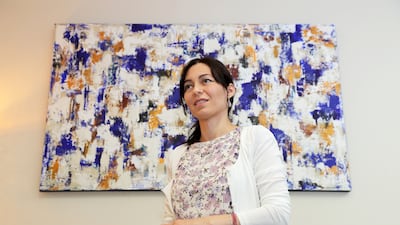A Ukrainian psychologist is offering free group therapy sessions for her fellow citizens living in the UAE who have been affected by the Russian attack on its neighbour.
Dr Ola Pykhtina, a licensed psychologist, art and play therapist based in Dubai, said the virtual sessions are designed to help people process their feelings as Ukraine reels from the Russian bombardment with civilians killed and buildings destroyed.
She said people should not be afraid to seek support because they will be able to help their children, community and family members back home.
The sessions are also open to Ukrainians and Russians, many of whom, as she points out, do not support the attack.
“We got all sorts of responses for that, but the intention was to support people in this situation to unite to see each other,” said the psychologist with Thrive Wellbeing Centre in Jumeirah Lakes Towers.
“Of course it triggers all sorts of reactions. Not everyone in Russia is Putin,” she said.
“But when people are under threat, when their homes are bombed, it’s very difficult to think straight, logically, because we become emotional.”
Dr Pykhtina is from Nikolayev, in the south of the country, where the train station and a military base near her parents’ house have been struck.
Her advice to fellow Ukrainians and others affected is to try to stay calm, hopeful and connected.
“And when I say to stay connected, what I mean is to stay connected to your own humanity,” she said, pausing to compose herself.
“And stay connected to each other and your community, with friends and family. It doesn’t matter what country the come from, whether they are English, British, Russian, Polish or Ukrainian.”
She initially asked herself whether she was capable of holding the groups, creating a space for people to express their emotions, while addressing a topic which is personally painful for her.
“Of course it is not easy,” she said.
“But it does not stop me. It is better to understand people, what they are going through and what they are saying. The idea is to create a safe space for people to express their emotions to see how others are dealing with that.
“I want to give some tools so people can use tools for stress management, for anxiety management, and calming down that emotional brain you just witnessed in me, also.”
Dr Pykhtina, who works with young people through art and play-based therapy, is also holding sessions to teach people how to talk to children about the war, as it can be particularly hard for them to understand.
“I think what we as adults tend to do is we feel the pressure of having an answer, and one answer.
“And I think we forget it’s OK to say ‘I don’t know, I am figuring it out with you.’ And asking them, ‘what do you think is happening?’” she said.

She said that by asking the question, they get the opportunity to voice their fears, some of which will be irrational. Because children do not understand, they come to conclusions and they can, especially if they are younger, think it will go on for ever.
“If they don’t voice it there is no opportunity to reassure them, to process it. So it will be suppressed,” she said.
Parents should start by asking their children why they think it is happening. There is no need to provide a logical, concrete answer, she said.
“It’s more about admitting this is a tragedy happening and a difficult situation. People are trying to come together to stop it,” said Dr Pykhtina.
People should not be afraid to seek psychological support, especially at this time. It is normal, she said.
“It doesn’t mean there is something terribly wrong with you if you are seeking help, because I think that is something stereotypical.”
Sessions will be held for those affected on March 7 and 8, from 10am to 11am and 3pm to 4pm, as well as March 3 and 10, from 3pm to 4pm for parents to learn how they should speak to their children about it.
They will be available in Ukrainian, Russian and English and interested people can email reception@thrive.ae to register.
















































